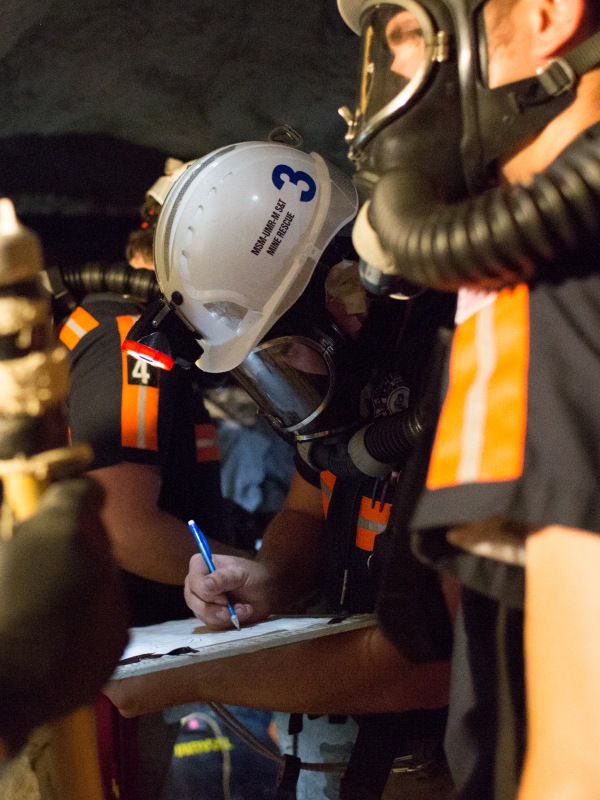General Information
The Mining Engineering program offers a non-thesis Master’s degree aimed at equipping students with advanced knowledge in mining operations, resource extraction, mineral processing, safety, and sustainability. Coursework includes topics such as mining methods, mineral processing, environmental sustainability, and advanced technologies in mining. Laboratory sessions, where applicable, are conducted at the mining engineering laboratories, Missouri S&T Experimental Mine, or associated research facilities. Graduates are prepared for roles in industry, government, consulting, and academia, addressing the challenges of modern mining operations.
Physical sciences and Engineering graduates with undergraduate deficiencies in Mining Engineering shall make up the following two core courses in Mining Engineering: Surface Mining Methods (5933/6933) and Underground Mining Methods (5932). Additionally, they must select at least one of the following specialized mining courses: Mine Atmosphere Control (5113), Rock Mechanics (5823), or Environmental Aspects of Mining (5742). These deficiencies will be determined before admission or during the first two weeks of enrollment in the first semester. The successful completion of these courses shall be credited to the requirements for the graduate program a student is enrolled in at the time of course registration.
Admission Requirements
- BS in Engineering or Physical Sciences
- Minimum GPA: 3.0
- Transcripts
- English Proficiency: Required for international students
Program Requirements
- Total Credit Hours: 30
- Minimum 9 credit hours of 6000-level courses
- 12 credit hours of core courses and 18 credit hours of elective courses
Core Courses (12 Credit Hours)
Except for MIN ENG 6080, advisors will work with students with undergraduate degrees in mining engineering to find substitutes for core courses they have already completed.
- MIN ENG 6080: Graduate Project ( 3 credit hours, offered each semester)
- MIN ENG 5933: Surface Mining Methods ( 3 credit hours, offered every Spring Semester)
(or)
- MIN ENG 6936: Surface Mine Design, ( 3 credit hours, offered every Spring Semester)
- MIN ENG 5932: Underground Mining Methods ( 3 credit hours, offered every Fall Semester)
Two of the following courses:
- MIN ENG 5823: Rock Mechanics (LAB 1.0 and LEC 2.0, , offered every Spring Semester)
- MIN ENG 5742: Environmental Aspects of Mining ( 3 credit hours, offered every Spring Semester)
- MIN ENG 5113: Mine Atmosphere Control ( 3 credit hours, offered every Fall Semester)
List of Elective Courses (18 Credit Hours)
Students may select courses from the electives listed below or include up to nine credit hours outside the Mining Engineering program, as approved by their advisor.
- MIN ENG 5412: Aggregates Materials Sizing and Characterization (LAB 1.0 and LEC 2.0, offered Every Other Spring)
- MIN ENG 5423: Flotation and Hydrometallurgy (LAB 1.0 and LEC 2.0, offered Every Fall Semester)
- MIN ENG 5424: Mineral Processing II Mechanics and Design (LAB 1.0 and LEC 2.0, offered Every Spring Semester)
- MIN ENG 5522: Ore Reserve Analysis and Geostatistics (LAB 1.0 and LEC 2.0, offered Every Spring Semester)
- MIN ENG 6001: CFD for Particle and Fire Simulation (LAB 1.0 and LEC 2.0, offered Every Spring Semester)
- MIN ENG 6001: Computational Rock Mechanics (LAB 1.0 and LEC 2.0, offered Every Spring Semester)
- MIN ENG 6522: Mining Property Feasibility Studies and Evaluation Procedure (LAB 1.0 and LEC 2.0, offered Every Spring Semester)
- MIN ENG 6912: Advanced Simulation of Mining Systems (3 credit hours, offered Fall Semester Every Even Year)
- MIN ENG 6922: Optimization Applications in Mining (3 credit hours, offered Fall Semester Every Odd Year)
- MIN ENG 6992: Research Methods (3 credit hours, offered Every Fall Semester)
- EXP ENG 5914: Explosives Manufacturing (3 credit hours, offered Spring Semesters Even Year)
- EXP ENG 6212: Theory of High Explosives (3 credit hours, offered Spring Semesters Even Year)
Course Availability
A full list of course availability and timing can be found here: https://cec.mst.edu/academics/course-availability/.
Please note: During the semester a student will have completed nine hours of graduate credit, the student must formally plan the remainder of their graduate program in consultation with their academic advisor, and submit a Form 1 for approval, first to the department chair and then to the vice provost of graduate education.


Follow Mining and Explosives Engineering